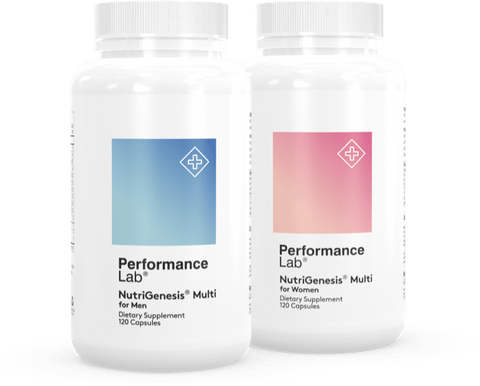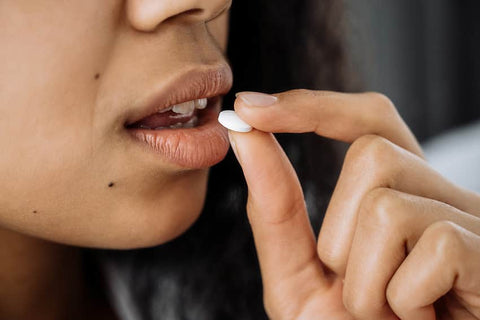Regarding nutrient deficiencies, we commonly cross paths with a few: vitamin D, vitamin C, omega-3s, and iron… but we rarely hear much about two critical to optimal performance: zinc and vitamin B12.
Zinc and vitamin B12 are two micronutrients essential for proper nervous system function, and inadequate intake can result in some hefty consequences. We’re diving into everything you need to know about zinc and vitamin B12—what they are, why you need them, and where to find them.
What Is Zinc And Why Do You Need It?
If you’ve heard about zinc, you’ve probably heard of it in relation to men’s health. While it plays a significant role in keeping men running, it’s also involved in a lot more:
- Enzyme reactions
- Gene expression
- Immune responses
- Protein synthesis
- DNA synthesis
- Wound healing
- Growth and development
As the second most abundant trace mineral in the body—only after iron—zinc is present in all cells and is required for the activity of over 300 enzymes involved in metabolism, digestion, nervous system function, and more 1, 2.
Zinc is a major healing mineral and also a champion for immune support. It supports the proper function of the thymus gland (an organ involved in immune function) and is required alongside B6 to keep it working correctly.
It affects multiple aspects of immunity ranging from skin barrier function and gene regulation within lymphocytes to the normal development and function of cells mediating nonspecific immune responses (neutrophils and NK cells) 3.
A zinc deficiency affects virtually all aspects of the immune system, as it prevents outgrowth and specific functions of T lymphocytes and compromises B lymphocyte function. Zinc is also a powerful antioxidant that plays a role in stabilizing cell membranes.
It’s clear that zinc is critical for optimal physiological function, but a deficiency isn’t always the result of low dietary intake—it’s also affected by what’s in the diet. Compounds like phytic acid can interfere with the bioavailability of certain minerals, decreasing absorption and influencing levels.
What Is Vitamin B12 And Why Do You Need It?
Vitamin B12, also known as cobalamin, is a water-soluble nutrient generally found as part of a B complex. Like other B vitamins, B12 plays a vital role in energy production, along with red blood cell formation (hematopoiesis), DNA synthesis, brain development, nervous system function, fatty acid synthesis, and myelin formation (nervous system) 4.
Like zinc, B12 requires a specific protein called intrinsic factor for absorption. It’s produced by parietal cells in the stomach and functions to bind B12 to form an IF-B12 complex that allows it to be absorbed in the intestines 5.
Without the presence of IF, B12 cannot be absorbed into systemic circulation unless taken sublingually.
Benefits Of Taking Zinc And B12 Together
1. Immune Function
When it comes to immune support, zinc is a superstar. It’s involved in several aspects of the immune system, including 6:
- Development and function of innate immune cells (neutrophils and NK cells)
- Macrophage function
- Phagocytosis
- Intracellular killing
- Cytokine production
Insufficient zinc levels impair these functions and weaken immunity, thus increasing the risk of illness and infection.
Vitamin V12 also plays a role in maintaining optimal immune function through its role in red blood cell production. Organs of the immune system require proper oxygenation to function, and a B12 deficiency can interrupt the delicate processes involved in immune responses, weakening your body’s defenses.
There’s also some evidence suggesting an immunomodulatory role of B12, although the exact mechanisms aren’t clear 7.
2. Skin Health
The B vitamins and zinc are a powerhouse for supporting healthy skin. Vitamin B12 plays a crucial role in cell reproduction and is beneficial for reducing inflammation, dryness, acne, and sometimes even treating conditions like psoriasis and eczema.
Studies suggest that a B12 deficiency can manifest as hyperpigmentation, hair and nail changes, and oral changes like glossitis, vitiligo, atopic dermatitis, and acne 8.
On the other hand, zinc is also essential for skin health.
Topical applications of zinc have been used as soothing agents for several dermatological conditions, including skin infections, warts, inflammatory disorders (acne, rosacea), pigmentary disorders (melasma), and neoplasias (basal cell carcinoma) 9.
And studies confirm the positive effects of topical and oral zinc treatment on improving acne. It does so by reducing inflammation, inhibiting P. Acnes bacterial growth, and suppressing the activity of oil glands 10. It’s also shown that people who struggle with acne have lower levels of zinc 11.
3. Reduces Inflammation
Chronic inflammation underlies several debilitating conditions, and there’s research suggesting that adequate levels of zinc and B12 can help regulate levels of inflammation.
The ability of zinc to function as an antioxidant and stabilize cell membranes indicates it may be involved in preventing free radical-induced injury when the inflammatory process is activated 6. Supplementation with zinc has been shown to decrease oxidative stress and lower the production of inflammatory cytokines 12.
Although not as potent, vitamin B12 also offers protection against inflammation and cardiovascular disease risk through its role as a cofactor for converting homocysteine to methionine.
TNF-α is one of the primary markers associated with inflammation. A large body of evidence suggests a link between B12 deficiency and a greater incidence of inflammation and associated metabolic complications 13.
4. Improves Mood
If your mood has been wonky, it could result from nutrient deficiencies. Although several nutrients are required to produce neurotransmitters that regulate mood, vitamin B12 and zinc are two that play an essential role.
Studies have found that a B12 deficiency can cause hematological changes and neurological and psychiatric problems, which present as irritability, personality changes, depression, and memory loss, and can also worsen depression due to accumulation of homocysteine 5, 14.
At the same time, zinc has an equally important role in the production of neurotransmitters like serotonin and dopamine and the production of brain-derived neurotrophic factor (BDNF), which regulates mood.
Low zinc levels have been linked to decreased BDNF and GABA, which interfere with mood and increase the risk of anxiety and depression 15-17.
Other potential benefits of supplementing zinc and B12 together include:
- It supports red blood cell production and tissue oxygenation
- Protects cardiovascular health
- Supports brain health
Deficiency Symptoms
Zinc
Severe zinc deficiency is relatively rare, but as we said before, sometimes it’s not about how much you’re eating as much as it is about how much you’re absorbing.
If you’re consuming a heavily plant-based diet high in anti-nutrients—compounds in plant foods that inhibit the absorption of minerals—you could be eating enough and still be low.
Some of the most common symptoms of a zinc deficiency include 18, 19:
- Impaired growth and development
- Delayed sexual maturity (in children)
- Skin rashes
- Chronic diarrhea
- Impaired wound healing
- Decreased immunity
- Thinning hair
- Poor appetite
- Mood disturbances
- Dry, flaky skin
- Fertility issues
Vitamin B12
Vitamin B12 deficiency is less common than you suspect and develops over time, but if you think you may be low, watch out for these signs and symptoms:
- Numbness or tingling in hands or feet
- Muscle weakness
- Difficulty walking
- Nausea
- Low appetite
- Weight loss
- Irritability
- Fatigue
Where To Find Them
Although B12 and zinc are widely available in many food sources, following a plant-based diet can make getting enough tricky, as both nutrients tend to be concentrated in animal sources. Why not skip the hassle and stress and make things easy?
When you supplement with Performance Lab NutriGenesis Multi, you feel confident that you’re giving your body what it needs to thrive. Multi is a state-of-the-art multivitamin supplying 100% DV of 17+ essential vitamins and minerals.

And if you’re concerned about absorption, don’t fret—NutriGenesis vitamins and minerals are complexed with cofactors to enhance absorption and maximize bioactivity. That way, you know that what you’re taking is being put to good use.
References
- Lim KH, Riddell LJ, Nowson CA, Booth AO, Szymlek-Gay EA. Iron and zinc nutrition in the economically-developed world: a review. Nutrients. 2013;5(8):3184-3211.
- Zastrow ML, Pecoraro VL. Designing hydrolytic zinc metalloenzymes. Biochemistry. 2014;53(6):957-978.
- Shankar AH, Prasad AS. Zinc and immune function: the biological basis of altered resistance to infection. Am J Clin Nutr. 1998;68(2 Suppl):447S-463S.
- Ankar, A, Kumar, A. Vitamin B12 Deficiency. (Updated 2021 Jun 7). In: StatPearls (Internet). Treasure Island (FL): StatPearls Publishing; 2022 Jan-. Available from: https://www.ncbi.nlm.nih.gov/books/NBK441923/
- Oh R, Brown DL. Vitamin B12 deficiency. Am Fam Physician. 2003;67(5):979-986.
- Prasad AS. Zinc in human health: effect of zinc on immune cells. Mol Med. 2008;14(5-6):353-357.
- Tamura J, Kubota K, Murakami H, et al. Immunomodulation by vitamin B12: augmentation of CD8+ T lymphocytes and natural killer (NK) cell activity in vitamin B12-deficient patients by methyl-B12 treatment. Clin Exp Immunol. 1999;116(1):28-32.
- Brescoll J, Daveluy S. A review of vitamin B12 in dermatology. Am J Clin Dermatol. 2015;16(1):27-33.
- Gupta M, Mahajan VK, Mehta KS, Chauhan PS. Zinc therapy in dermatology: a review. Dermatol Res Pract. 2014;2014:709152.
- Bae YS, Hill ND, Bibi Y, Dreiher J, Cohen AD. Innovative uses for zinc in dermatology.Dermatol Clin. 2010;28(3):587-597.
- Rostami Mogaddam M, Safavi Ardabili N, Maleki N, Soflaee M. Correlation between the severity and type of acne lesions with serum zinc levels in patients with acne vulgaris. Biomed Res Int. 2014;2014:474108.
- Prasad AS. Zinc: an antioxidant and anti-inflammatory agent: role of zinc in degenerative disorders of aging. J Trace Elem Med Biol. 2014;28(4):364-371.
- Al-Daghri NM, Rahman S, Sabico S, et al. Association of Vitamin B12 with Pro-Inflammatory Cytokines and Biochemical Markers Related to Cardiometabolic Risk in Saudi Subjects. Nutrients. 2016;8(9):460.
- Stabler SP, Allen RH, Savage DG, Lindenbaum J. Clinical spectrum and diagnosis of cobalamin deficiency. Blood. 1990;76(5):871-881.
- Petrilli MA, Kranz TM, Kleinhaus K, et al. The Emerging Role for Zinc in Depression and Psychosis.Front Pharmacol. 2017;8:414.
- Russo AJ. Decreased zinc and increased copper in individuals with anxiety. Nutr Metab Insights. 2011;4:1-5.
- Mlyniec K. Interaction between Zinc, GPR39, BDNF and Neuropeptides in Depression. Curr Neuropharmacol. 2021;19(11):2012-2019.
- Nistor N, Ciontu L, Frasinariu OE, Lupu VV, Ignat A, Streanga V. Acrodermatitis Enteropathica: A Case Report. Medicine (Baltimore). 2016;95(20):e3553.
- Saper RB, Rash R. Zinc: an essential micronutrient. Am Fam Physician. 2009;79(9):768-772.












